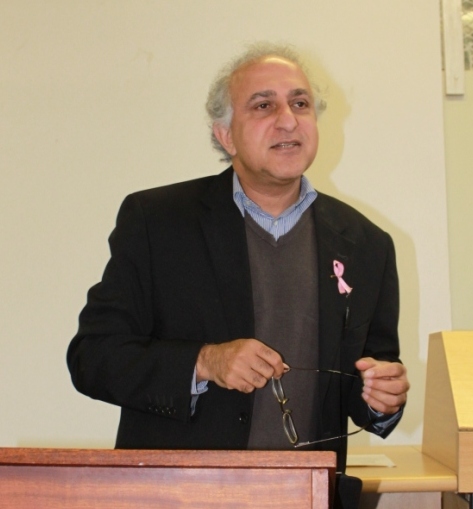
“For the long years of meticulous research and finally the superb telling of the story of banishment under apartheid, we owe a great debt to the author,” writes renowned advocate George Bizos on Dr Saleem Badat’s latest book.
The Vice-Chancellor recently completed The Forgotten People: Political banishment under Apartheid while on sabbatical at the University of California: Berkeley in the USA. The book has taken him 30 years to complete, since 1982,when he promised Helen Josephthat he would draw attention to this largely ignored part of our history. The Forgotten People was launched on 10 October at Freedom Park inPretoria, and since then at Wits, and in Grahamstown and Durban.
Dr Badat shared his insights with the staff and students of the Law faculty in a seminar presentation titled “Political Banishment, Law and the South African Courts, 1948-1986” after presenting another seminar in the History department. His paper to the Law Faculty is one of four papers he is preparing for submission to academic journals.
According to him, “quintessentially, banishment was government reprisals against key, principally rural, political opponents, which involved their administrative expulsion from their home areas to other, usually distant, desolate and inhospitable, areas for unlimited periods.”
“Opponents of the state were banished when the state could not secure prosecutions and prison sentences through the courts, or when officials were not confident about securing guilty verdicts and imprisonment. In some cases, as when political opponents were banished immediately upon their release from prison, banishments effectively extended the punishment of political opponents.”
“We’re talking about a phenomenon that is not written about at all,” he says, stating that he has determined that between 1948 and 1986 at least 160 people were banished. “101 people were banished within the first decade of apartheid alone, 125 by 1960 and the vast majority by 1965.
140 people were banished from rural areas,” he said, emphasising that political opponents of apartheid from rural areas who were banished have not been given recognition and “still aren’t. They remain the forgotten people, hidden from view.”
Most of the banished were expelled to sparsely populated areas, including two ‘camps’ (Frenchdale and Driefontein in the Northern Cape). On average they spent nine years in banishment; some spent over 15 years. 17 people died during their banishment.
Dr Badat noted that banishment was an old practice and has occurred all over the world, being used by the English and with the Dutch East India Company. The latter banished numerous people from Indonesia to the cape in the 17th and 18th centuries.
He made a distinctionbetween imprisonment, deportation, exile and banishment “as these are not interchangeable terms” and noted that “eminent writers are wont to conflate these different practices”.
Banishment was often enforced when the security police didn’t have enough evidence to take the supposed troublemaker to court. “You could ask for reasons but only after banishment has been carried out,” and no interdicts were issued after 1956. Only three out of 20 known cases of court challenges were successful and by 1956 all loopholes to challenge banishment had been exhausted.
Dr Badat believes that banishment is “the worst kind of political punishment or politicalreprisal because in prison you were part of a community and in detention you may, if you were lucky, beseen by a lawyer”.
In a remarkable judgement of a high profile case, which was brought before the British parliament, Anderson Ganyile (now 76 years old and one of the few survivors) was banished from Binzana. He was banished to the Northern Cape, escaped and returned to continue resistance to apartheid in Mpondoland. Eventually he was smuggled out of South Africa by Helen Joseph to Lesotho disguised as an ‘injured’ patient.
Ganyile was kidnapped by South African police and retuned to South Africa and kept in a jail I Kokstad. Rowley Arenstein, a Durban-based attorney made an application for his release to Justice Wynn, who was based in Grahamstown. Wynn rejected the application for which he was criticised when the matter was appealed.
“The courts accommodated banishment and failed to defend the human rights of those who were banished,” says Dr Badat. “Essentially the judiciary subordinated itself to the legislature and the executive”.
He noted that “ultimately all laws exist within a socio-economic and political framework, and you can only understand them in relation to the political economy of a society.” He argued that a grave shortcoming of the Truth and Reconciliation Commission (TRC) was that it failed to acknowledge all those who were banished, including only 14 of 160 people in its list of those whose human rights were deemed to have been violated.
As a result the banished and their families have not received special pensions or reparations. Emphasising the importance of dealing with South Africa’s troubled past, Dr Badat strongly feels that “we need to engage with the unrelieved pain” of our past before we can heal and move on. “Bringing banishment to light is an engagement with a forgotten part of our history- we need to deal with this,” he concluded.
Dr Badat says banishment remains largely unexplored by scholars and urged the students present to consider research on banishment for their Masters and PhD theses.
